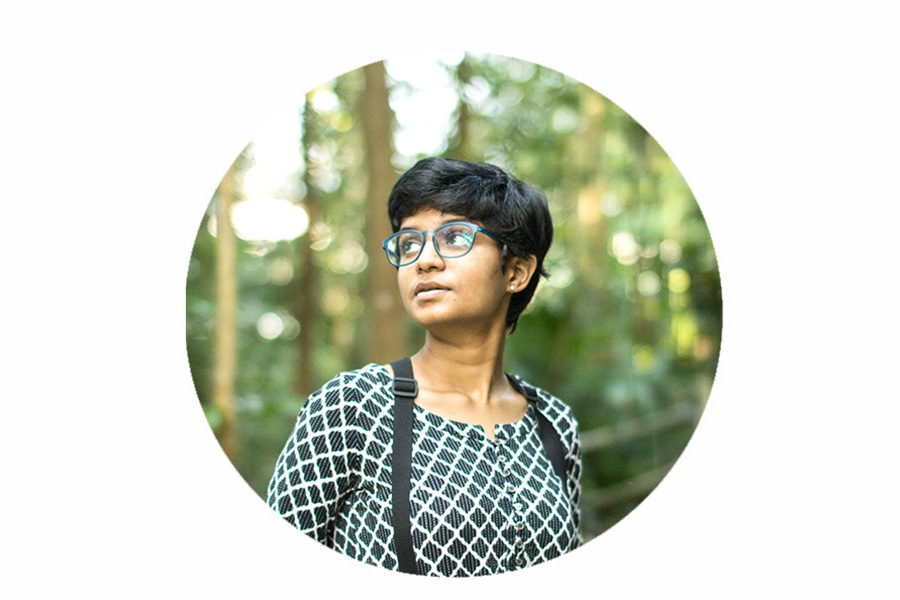Language of Love

Age: 18
Occupation: Gap-year student and incoming freshman (class of 2023) at Stanford University
Birth place: Singapore
Current city of residence: Singapore
I mix up Mandarin and Hindi a lot. I don’t always realize it at first-only after my grandmother or teacher falls silent do I think to backtrack, review the sentence, and figure out which words were from another language. Oops.
It keeps happening over and over, which is perplexing given how structurally and syntactically dissimilar the two languages are. I learned Mandarin formally by shaping phrases over and over in a classroom. My Hindi was absorbed from kitchen conversations at home, semi-fluency constructed from grocery lists and gossip. But now I slip a Mandarin verb into the middle of a Hindi sentence without even thinking. As if I expect them—two radically separate approaches to words and grammar and script—to somehow seamlessly dance.
For me, India and China exist in parallel. Living in Asia, they mold daily politics and culture. The shapes of the countries exert a physical presence on my life. I hold the passport of one and I grew up in countries dominated by the other. Often, the two feel in opposition. The two superpowers seem to glare at each other across the mountains.
I see only one immediately obvious, inarguable, quantifiable similarity between China and India as they look today, which is their scale. Yet, in the afternoons in rural Shandong, our teacher called a small group of us to sit cross-legged in the sunlight. He had bought us each a copy of Confucius’s Analects, and we sat and read line by line, tearing the words apart as the sun turned a pollution-stained red. “A young man must remain devoted to his parents at home and respectful of his elders outside it.” The sentence reminded me of my curved back when we visited my grandparents’ friends in India. I would sit folding my hands, bowing my head, and they would place their wrinkled hands on my shoulder. They whispered, “God bless you, child.” I never knew that was from Analects.
We traced Confucius’s footsteps a few days later up Taishan (Mount Tai), one of the holiest mountains in China. A total of 72 emperors over time, up till and including Mao Zedong, have summited the peak. Each left an inscription—a poem, a pithy quote or a grand declaration—behind, engraved by the stairs in careful calligraphy. Every step took us back a millennium, and the next step forward again. This past was new to me. But the depth was as familiar as a drive through Delhi’s Chandni Chowk neighborhood-the Red Fort and the tangled electricity lines beside it.
The scale of India and China extends through both the past and the present. Each place forces confrontation with largely unbroken roots branching back to the beginning. I’ve learned to recognize it in small things—a dilapidated temple or a rice field with a single farmer—that spark a sudden, destabilizing déjà vu. These things have been happening last generation and two generations before that and ten more before that. Maybe the farmer turns and takes out a smartphone. There have been so many people before me here, and there will be so many after. Whether reading the Romance of the Three Kingdoms or the Mahabharata,how can anyone determine that their stories—their morals, their loves, their losses—are new? Every tale has been told before, and these countries are vast enough to foster them all.
But this means that every old tale must be told again. From my mother and my Chinese teacher, I learned to hold my heritage in high regard. Dutta Gupta Tanvi. Du Tian Wei. I am young, and I am new, and that means that to determine who I am, I must examine my family closely. In Mandarin class, I gave presentations on the importance of sweeping your ancestors’ graves. Later, I went home to where my grandparents’ pictures are displayed in effigy.
Even as both countries undergo unprecedented migrations from rural areas to cities, everyone remembers the village they came from. You take along dust on your feet and a family name. Because in a place of over a billion individuals, you are not one: You are also everyone who came before you-their sacrifice and courage. India and China both host a vastness of the past and of the present, but it is important to build links between the two. These links are in people and families and a responsibility to each other that often translates as duty but should more accurately be seen as love.
Love isn’t always expressed the same, but it’s a vocabulary that is shared everywhere.
